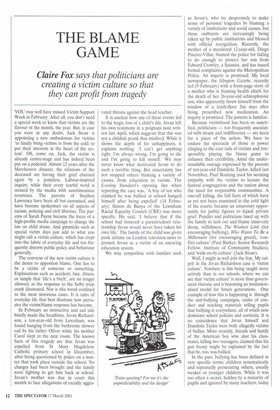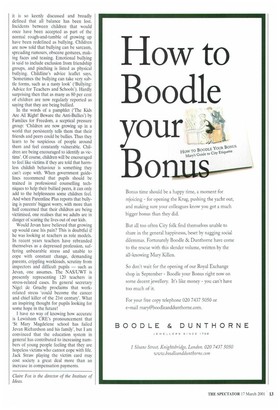THE BLAME GAME
Claire Fox says that politicians are
creating a victim culture so that they can profit from tragedy
YOU may well have missed Victim Support Week in February. After all, you don't need a special week to know that victims are the flavour of the month, the year. But, in case you were in any doubt, Jack Straw is appointing a new ombudsman for victims 'to finally bring victims in from the cold; to put their interests at the heart of the system'. Oh, come on, Jack, the victim is already centre-stage and has indeed been put on a pedestal. Almost 12 years after the Marchioness disaster, the relations of the deceased are having their grief churned again by a pointless, Labour-inspired inquiry, while their every tearful word is treated by the media with sanctimonious reverence. The parents of Stephen Lawrence have been all but canonised, and have become spokesmen on all aspects of racism, policing and civil liberties. The parents of Sarah Payne became the focus of a high-profile media campaign to change the law on child abuse. And gimmicks such as special victim days just add to what you might call a victim culture, which has crept into the fabric of everyday life and too frequently distorts public policy and behaviour generally.
The converse of the new victim culture is the desire to apportion blame. One has to be a victim of someone or something. Explanations such as accident, fate, illness, or simply that life's a bitch', are no longer allowed, as the response to the Selby train crash illustrated. Nor is this trend confined to the most notorious cases. It is tales of everyday life that best illustrate how pervasive the victim/blame response has become.
In February an instructive and sad tale briefly made the headlines. Jevan Richardson, a ten-year-old from Lewisham, was found hanging from the bathroom shower rail by his father Oliver while his mother Carol slept in the next room. The known facts of this tragedy are that Jevan was expelled from St Mary Magdelene Catholic primary school in December, after being questioned by police on a matter that took place outside the school. No charges had been brought and the family were fighting to get him back at school. Jevan's mother was due in court this month to face allegations of racially aggra vated threats against the head teacher.
It is unclear how any of these events led to the tragic loss of a child's life. Jevan left his own testimony in a poignant note written last April, which suggests that this was not a childish prank that misfired. While it shows the depth of his unhappiness, it explains nothing: 'I can't get anything right. I'm always wrong. I'm going to die and I'm going to kill myself.' We may never know what motivated Jevan to do such a terrible thing. But uncertainty has not stopped others blaming a variety of causes, from education to racism. The Evening Standard's opening line when reporting the case was, 'A boy of ten who claimed he was bullied at school hanged himself after being expelled' (14 February). Simon de Banya of the Lewisham Racial Equality Council (CRE) was more specific. He said, 'I believe that if the school had fostered a parent/school relationship Jevan would never have taken his own life.' The family of the child was given peak airtime on London television news to present Jevan as a victim of an uncaring education system.
We may sympathise with families such as Jevan's, who try desperately to make sense of personal tragedies by blaming a variety of institutions and social causes, but these outbursts are increasingly being taken up by public institutions and blessed with official recognition. Recently, the mother of a murdered 12-year-old, Diego Pineiro-Villar, blamed the police for failing to do enough to protect her son from Edward Crowley, a Satanist, and has issued formal complaints against the Metropolitan Police. An inquiry is promised. My local newspaper, the Islington Gazette, recently led (9 February) with a front-page story of a mother who is blaming health chiefs for the death of her 26-year-old schizophrenic son, who apparently threw himself from the window of a tenth-floor flat days after being prescribed new medication. An inquiry is promised. The pattern is familiar.
Because victimhood has been so sanctified, politicians — too frequently associated with sleaze and indifference — are keen for a piece of the action. We have to endure the spectacle of those in power clinging to the coat tails of victims and irresponsibly playing the blame game to enhance their credibility. Amid the understandable outrage expressed by the parents of ten-year-old Damilola Taylor, killed last November, Paul Boateng used his seeming empathy with the victims to lecture the funeral congregation and the nation about the need for responsible communities. A one-off killing, the full facts of which have as yet not been examined in the cold light of the courts, became an unsavoury opportunity for public figures to hijack private grief. Pundits and politicians lined up with the family to lash out and blame inner-city decay, selfishness, The Weakest Link (for encouraging bullying), Who Wants To Be a Millionaire (for encouraging greed), 'conflict culture' (Paul Barker, Senior Research Fellow, Institute of Community Studies), and 'walk-on-by culture' (Jack Straw).
Well, I might as well join the fray. My culprit in the Jevan Richardson case is 'victim culture'. Nowhere is this being taught more actively than in our schools, where we can see that 'victim culture' is more than government rhetoric and is becoming an institutionalised model for future generations. One example of how this is happening is through the anti-bullying campaigns, codes of conduct and teaching materials telling pupils that bullying is everywhere, all of which now dominate school policies and curricula. It is no coincidence that Jevan himself and Damilola Taylor were both allegedly victims of bullies. More recently, friends and family of the American boy who shot his classmates, killing two teenagers, claimed that his gun frenzy might be explained by the fact that he, too, was bullied.
In the past, bullying has been defined in very specific terms: children systematically and repeatedly persecuting others, usually weaker or younger children. While it was too often a secret, hidden by a minority of pupils and ignored by many teachers, today it is so keenly discussed and broadly defined that all balance has been lost. Incidents between children that would once have been accepted as part of the normal rough-and-tumble of growing up have been redefined as bullying. Children are now told that bullying can be sarcasm, spreading rumours, obscene gestures, making faces and teasing. Emotional bullying is said to include exclusion from friendship groups, and pinching is listed as physical bullying. Childline's advice leaflet says, 'Sometimes the bullying can take very subtle forms, such as a nasty look' ('Bullying: Advice for Teachers and Schools'). Hardly surprising then that as many as 80 per cent of children are now regularly reported as saying that they are being bullied.
In the words of a pamphlet (The Kids Are All Right! Beware the Anti-Bullies') by Families for Freedom, a sceptical pressure group: 'Children are now growing up in a world that persistently tells them that their friends and peers could be bullies. Thus they learn to be suspicious of people around them and feel constantly vulnerable. Children are being encouraged to identify as victims'. Of course, children will be encouraged to feel like victims if they are told that harmless childish behaviour is something they can't cope with. When government guidelines recommend that pupils should be trained in professional counselling techniques to help their bullied peers, it can only add to the helplessness some children feel. And when Parentline Plus reports that bullying is parents' biggest worry, with more than half concerned that their children are being victimised, one realises that we adults are in danger of scaring the lives out of our kids.
Would Jevan have believed that growing up would ease his pain? This is doubtful if he was looking at teachers as role models. In recent years teachers have rebranded themselves as a depressed profession, suffering unbearable stress and unable to cope with constant change, demanding parents, crippling workloads, scrutiny from inspectors and difficult pupils — such as Jevan, one assumes. The NAS/UWT is presently representing 120 teachers in stress-related cases. Its general secretary Nigel de Gruchy proclaims that workrelated stress 'could become the cancer and chief killer of the 21st century'. What an inspiring thought for pupils looking for some hope in the future!
I have no way of knowing how accurate is Lewisham CRE's pronouncement that 'St Mary Magdelene school has failed Jevan Richardson and his family', but I am convinced that the education system in general has contributed to increasing numbers of young people feeling that they are hopeless victims who cannot cope with life. Jack Straw playing the victim card may cost society a great deal more than an increase in compensation payments.
Claire Fox is the director of the Institute of Ideas.



































































 Previous page
Previous page